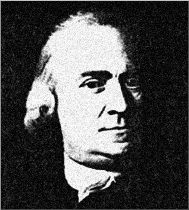
Nobody could beat Samuel Adams (1722-1803) when it came to radical political activism. If you wanted to set up an organization, stage a protest or overthrow a government, he was your man.
Adams (cousin of another great Revolutionary, John Adams) had considered becoming a preacher—his style was evangelical enough—but studied law instead, and found his true calling as a politician. He first became interested in the politics of the day as a result of his father's troubles with the authorities. Samuel's own clashes with the powers that be helped him hone his combat abilities. One thing he learned was "put your adversaries in the wrong. And keep him there." When his house was at risk of being sold at auction to pay off old debts, Adams took out ads warning the new sheriff to keep his mitts off it.
Like Benjamin Franklin, though, Adams knew how to communicate his opinions with delicacy. "As he mingled at the taverns, the lodges and the volunteer fire companies, he asked shopkeepers and shipworkers their opinions and seemed to take their answers seriously," writes A.J. Langguth in his study of the American Revolution, Patriots. "He could explain political injustice to an illiterate sailor without condescending, and he had no use for Thomas Hutchinson's kind of social divisions. ... His own ideas were unshakable, but he offered them in a tentative way that flattered his listeners. ... He criticized such aristocrats as Hutchinson not as if he were a humble man who envied the lieutenant governor his wealth or position but as a moral superior."1
Adams had operated a brewing company with his father, but when his father died the business collapsed. He was never very well off financially, nor did he ever make much of an attempt to gain wealth. He spent a few years as one of Boston's five general tax collectors (Thomas Paine, too, had been a tax collector), but the town didn't receive many taxes through Samuel Adams. He was neither an entrepreneur nor a plunderer.
His true calling was politics, preferably of the revolutionary variety; and the times were certainly ripe for it. When Great Britain stepped up its efforts to extract more cash from the colonies in the 1760s, Adams flew into action, helping set up the Boston chapters of the Committees of Correspondence and Sons of Liberty, publishing his own Declaration of Colonial Rights, and arguing as forcefully as possible that his compatriots should throw off the colonial shackles. He was a constant presence in the pre-revolutionary struggle against British rule.
In 1770 Adams led the response to the Boston Massacre (an incident in which redcoats fired into a crowd of taunting civilians), exaggerating the dimensions of the tragedy to increase pressure on the British to withdraw. By 1773 Adams was helping organize the so-called Boston Tea Party, in which Bostonians protested the British monopoly on tea trade by dressing up as Indians and tossing tea into Boston Harbor. When the Brits responded by shutting down the Harbor and clamping restrictions on Town Meetings, Adams urged a general boycott of British trade.
Adams served in both the First and Second Continental Congress, and was a signer of the Declaration of Independence. Although initially opposed to the Constitution that would supersede the Articles of Confederation, he ultimately supported its ratification. He also helped draft the Massachusetts state constitution, and served as the state's governor from 1793 to 1797.
Copyright © 2000, The Daily Objectivist - Reprinted with permission of The Daily Objectivist and Davidmbrown.com.
25 Nov 2008 (last edit: 21 May 2025)
You can assist the work of Freedom Circle by purchasing one of the works discussed above:
-
A. J. Langguth, Patriots: The Men Who Started the American Revolution, New York: Simon and Schuster, 1988, p. 33. (Freedom Circle note) ↩︎
